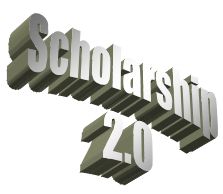Innovation and academia might seem inseparable, but ‘novelties’ such as collaborative research and digital deliverables are often still seen by academic authorities as being an unacceptable encroachment upon the sovereignty of the paper-bound work of the solitary scholar
This panel considers the quantum leaps required to disentangle the particular contributions of individual collaborators. Also, how do you evaluate the eligibility for tenure of those whose submission, instead of merely being a paper, consists of the building of a scholarly information infrastructure resource which other scholars cite in their papers?
This panel session was called:
New Methods for Evaluating Scholars & Their Research
It was held at an event called:
Creativity & Collaboration in the Academy:
A Symposium on Innovative Ways That Universities Do Research
The event was held on December 3, 2010 at the Davidson Center, University of Southern California
Here are the details of the speakers:
Martin Kaplan, director of the Norman Lear Center, is the Norman Lear Chair in Entertainment, Media and Society at the USC Annenberg School for Communication & Journalism. A summa cum laude in molecular biology from Harvard College, where he was president of The Harvard Lampoon, he was a Marshall Scholar in English at Cambridge University and has a PhD from Stanford in modern thought and literature.
Philip J. Ethington is Professor of History and Political Science at USC, North American Editor and Multimedia Editor of the journal Urban History (Cambridge University Press), and Co-Director (with Tara McPherson) of the USC Center for Transformative Scholarship. An interdisciplinary historian, Ethington’s scholarship explores the past as a cartography of time. He is currently completing a large-format graphic book, interactive online publication, and public art exhibit called Ghost Metropolis: Los Angeles, since 13,000 BP.
Genevieve Giuliano, PhD, conducts research on relationships between land use and transportation, transportation policy analysis, and information technology applications in transportation. Her current research includes analysis of regulatory policies aimed at reducing impacts of freight in metropolitan areas, development of metropolitan freight flow models, and analysis of changes in metropolitan spatial structure.
Tom Jordan is the Director of the Southern California Earthquake Center and the W. M. Keck Professor of Earth Sciences at USC. He is responsible for all aspects of SCEC’s program, which currently involves over 600 scientists at more than 60 universities and research institutions. He is a member of the California Earthquake Prediction Evaluation Council and the Governing Council of the National Academy of Sciences.
Martin L. Levine serves as the Vice Provost for Faculty Affairs at the University of Southern California. He is the UPS Foundation Chair in Law, and Gerontology and Professor of Psychiatry and the Behavioral Sciences, with joint appointments in the schools of Law, Gerontology, and Medicine. His book, Age Discrimination and the Mandatory Retirement Controversy, received the Phi Kappa Phi Faculty Recognition Award. As Vice Provost, he serves as the senior executive officer responsible to the Provost for USC’s 4300 faculty.
Shrikanth (Shri) Narayanan is the Andrew J. Viterbi Professor of Engineering at USC, and he holds appointments as Professor of Electrical Engineering, Computer Science, Linguistics and Psychology. He is also the inaugural director of the Ming Hsieh Institute. From 1995-2000 he was with AT&T Bell Labs and AT&T Research. Shri Narayanan is a Fellow of IEEE, the Acoustical Society of America, and the American Association for the Advancement of Science (AAAS).
Dr. Terence Sanger is the director of the USC Pediatric Movement Disorders Center. His research focuses on understanding the origins of pediatric movement disorders from both a biological and a computational perspective. Dr. Sanger coordinates the Childhood Motor Study Group (CMSG) and the NIH Taskforce on Childhood Movement Disorders, and he is principal investigator on several research studies at USC.

